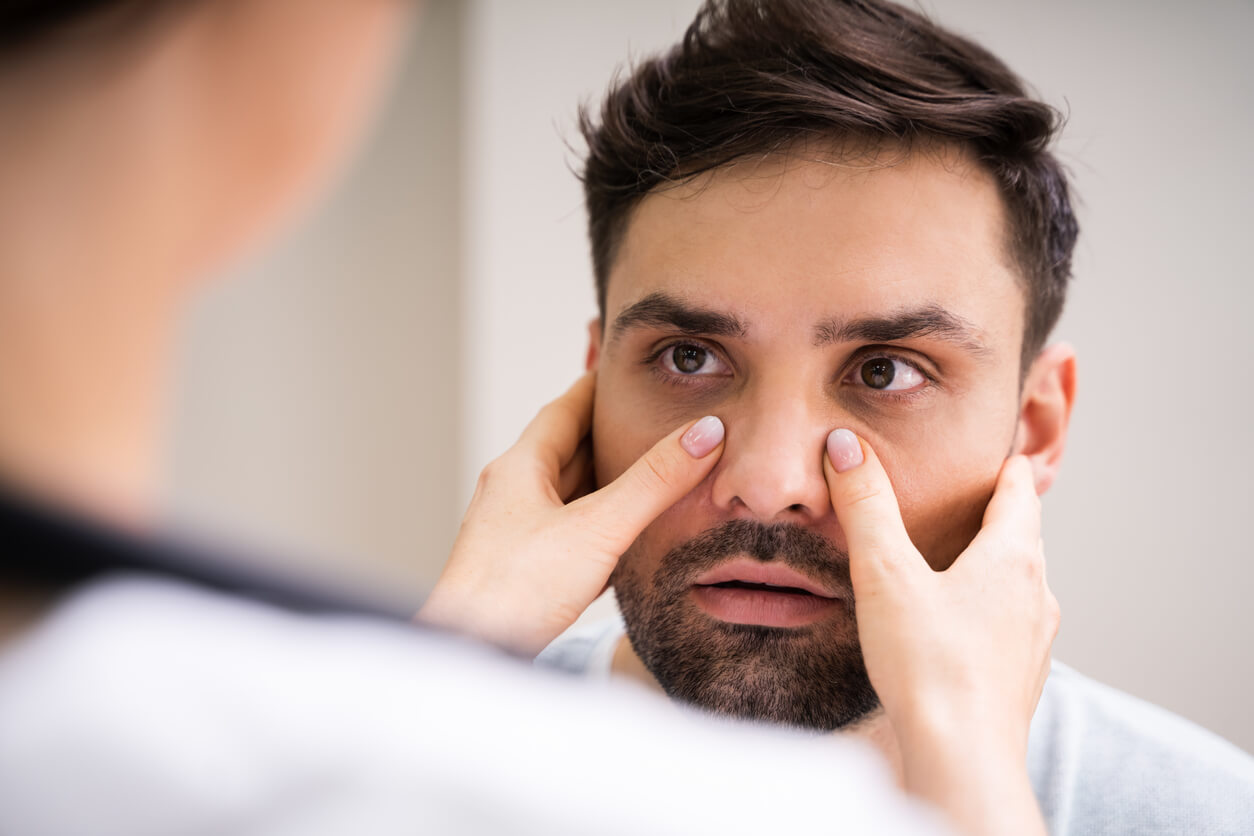Sinus Infection vs. Cold
Key takeaways
- Sinus infections and common colds are often caused by viruses and often have very similar symptoms
- A sinus infection is more likely to cause facial pain, while a common cold is more likely to cause symptoms below the neck (like body aches)
- Most sinus infections and colds will go away on their own within a few weeks, but you can use OTC medication and home remedies to soothe symptoms
Sinus infections and common colds cause many of the same symptoms, so it may be hard to distinguish between the two. However, these conditions require different treatment methods, so knowing their differences is important. In this article, we will outline some of these illnesses' shared characteristics and symptoms and dive into their significant differences.
What is a sinus infection?
Sinus infections are infections of the sinuses, which are air-filled cavities behind the nose, cheekbones, and forehead. Sinus cavities are lined with a thin layer of tissue known as mucosa. Sinus infections occur when a germ infects the mucosa, causing it to become inflamed and swollen.
Acute sinusitis is a relatively short-lived, one-time infection of the sinuses caused by a virus, bacteria, or fungus. A reaction to allergens (allergic rhinitis) can also cause these infections. Acute sinus infections will usually go away within 7-10 days. During this time, you can use over-the-counter medication and home remedies to soothe symptoms.
Chronic sinusitis is a persistent inflammation of the sinuses. Chronic sinus infections can result from an infection, nasal polyps (abnormal growths in the nasal passages), a deviated septum, or other underlying health issues brought on by a weakened immune system. Chronic sinusitis may require advanced medical treatment.
What is a common cold?
Common colds are the most prevalent form of upper respiratory infection. The upper respiratory system comprises your sinuses, throat, airways, and lungs. When these areas are infected with a virus or bacteria, they may become inflamed.
Colds are usually passed through microscopic droplets expelled when an infected individual coughs, sneezes or speaks. Inhaling these droplets can result in the infection passing to you. The rhinovirus is the most common type of cold virus transmitted between humans.
While colds do not directly cause sinus infections, the blockage and mucus buildup caused by a cold can become breeding grounds for bacteria. This can, in turn, lead to bacterial sinus infections (bacterial sinusitis).
What are the common symptoms of a sinus infection and a cold?
Sinus infections and colds are hard to tell apart because they often cause very similar symptoms.
Common symptoms of sinus infections and colds include:
- Runny nose (also known as nasal discharge or rhinitis)
- Nasal congestion (stuffy nose)
- Post-nasal drip
- Shortness of breath
- Sinus pressure or facial pressure
- Sore throat
- Decreased sense of smell
- Low-grade fever
How do I know if it’s a sinus infection or a cold?
You can tell a sinus infection and a common cold apart by the unique symptoms they cause. A good rule of thumb is to locate where the symptoms are in your body. Sinus infections rarely cause symptoms below the neck; most of the discomfort is centered around the face and head. If you have body aches below the neck, it is likely that you have a cold and not a sinus infection. Colds also cause coughing and sneezing, which are not common with sinus infections.
Here’s a closer look at the unique symptoms of these conditions.
Sinus infection symptoms
In addition to the symptoms listed above, sinus infections cause some unique symptoms compared to those caused by a common cold. This is generally due to the inflammation and swelling in the sinus cavities in the skull.
Symptoms unique to a sinus infection include:
- Bad breath
- Yellow or green mucus
- Facial pain
- Upper jaw pain
- Tooth pain/ toothaches
Common cold symptoms
Common colds also cause unique symptoms. This may be due to a viral infection in multiple parts of the upper respiratory system.
Symptoms unique to a cold include:
- Coughing
- Body aches
- Sneezing
When experiencing a common cold, children may experience a higher-grade fever than adults.
Length of illness
Another way to differentiate between a common cold and a sinus infection is by clocking how long your symptoms last.
Sinus infections tend to last longer than a common cold. A sinus infection generally lasts ten or more days, while a common cold usually lasts only seven. If you are experiencing symptoms for longer than seven to ten days, you should see a primary care provider to diagnose your condition. Sinus infections that last longer than ten days are more likely to be bacterial or fungal infections that require specific medical treatment.
How do I relieve symptoms of a cold or sinus infection?
Viral infections, whether a common cold or an acute sinus infection, are usually treated the same way. Although viral infections will go away on their own, you can use over-the-counter medication to ease your symptoms.
OTC medication:
Saline nasal spray: Over-the-counter nasal saline sprays (like Sinex) are widely available at most pharmacies. These sprays rinse and clean the nasal passages, reducing symptoms while preventing the infection from worsening.
Decongestants: Decongestants containing pseudoephedrine (like Sudafed) are available over the counter as nasal sprays, oral liquids, or tablets. Decongestants clear up the mucus blockage in the nasal passages, reducing sinus pain and nasal discharge symptoms. You should only use a nasal decongestant for a few days, as repeated use can cause more severe congestion.
OTC pain relievers: Pain relievers such as ibuprofen (Advil) and acetaminophen (Tylenol) help minimize pain and fever symptoms from a viral infection. These drugs will not help clear up a runny or stuffy nose but will help with discomfort caused by inflammation of the sinuses.
Home remedies:
Neti Pot/ sinus rinse: Neti Pots are common appliances used for nasal irrigation. To use one, put iodide and preservative-free salt water into the chamber. It is recommended that you boil the water first to sanitize it. Wait until the water is room temperature before you put it in the Neti Pot. Pour the solution into each nostril, per the device’s instructions. This saltwater rinse can help reduce congestion and pain caused by a sinus infection while cleansing the affected area.
Sip warm liquid: Warm water with honey and lemon or broth can soothe a sore throat and increase mucus flow, which can ease congestion.
Drink plenty of fluids: Fluids help thin mucus, allowing it to drain from the nasal passages more easily. This can help soothe congestion and stuffiness caused by a cold or sinus infection.
Moisten sinus cavities: Drape a towel over your head and breathe in the vapor from a bowl of hot water. This helps moisturize the nose, drain mucus, and relieve sinus infection symptoms. Alternatively, take a hot shower and inhale the warm, wet air. Use a humidifier at night, ensuring you use filtered water in the chamber.
Warm compress: A warm compress applied to your nose and forehead may help alleviate sinus congestion.
Rest: Your body is combatting a viral infection and needs to rest to heal. Make sure you get plenty of sleep and avoid any strenuous activities until your symptoms begin to clear up.
Specific sinus infection treatments
While ineffective in treating the symptoms of a common cold, there is OTC medication you can use to minimize discomfort from a sinus infection.
OTC medication:
Steroid nasal sprays: Nasal sprays containing the steroid fluticasone help reduce sinus inflammation. This can reduce symptoms of facial pain, sinus headaches, and congestion caused by a sinus infection.
Antihistamines: Allergy medication helps reduce your body’s reaction to allergens, irritants, and pollutants. Easing allergic reactions can help reduce inflammation and congestion from a sinus infection.
Talk to a healthcare provider if your symptoms do not go away within 7-10 days or if you begin noticing side effects after taking medication for a sinus infection.
Specific common cold treatments
Common colds, unlike sinus infections, may cause a cough. If a common cold is causing you to cough, you may use OTC cough medicine (usually syrup) to prevent this uncomfortable symptom. OTC cough medicine won’t treat the underlying condition but can reduce coughing symptoms.
Be sure to check the active ingredients of these medications if you are taking another form of pain reliever or antihistamine. Many of these drugs contain similar ingredients. Using too much of one ingredient can cause serious adverse side effects. In addition, you should not give cough medicine to children younger than 6. These drugs may cause serious side effects in young children.
How Sesame can help
Whether you have a case of the sniffles or a painful sinus infection, Sesame can help. Book an online doctor appointment on Sesame to speak to a licensed healthcare provider today. Providers on Sesame can address your symptoms, offer medical advice, and prescribe medication when appropriate. Book a visit today to start feeling better right away.









